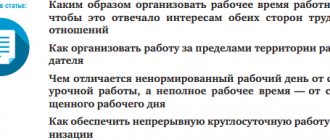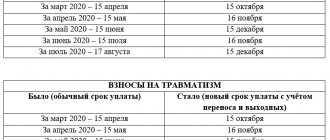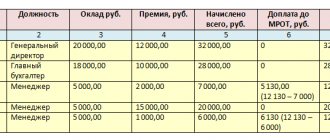Concept
Working time is the period during which a worker is obliged to fulfill his duties stipulated by the employment contract, as well as act in accordance with work regulations and other regulatory documents of the Russian Federation.
Working hours are recorded directly by the employer. The boundaries of working time and some of its other features (for example, the time and duration of the lunch break, other regime issues) are agreed upon by the parties in accordance with the legal acts of the state.
In addition to the periods indicated above, working time includes time periods recognized as idle periods; breaks provided separately to women mothers of children under the age of one and a half years, time allotted for meals, as well as time periods allotted for preparatory and final activities.
Working time as a legal category
The fundamental legal norm establishing the ratio of time spent on work and rest is Art. 37 of the Constitution of the Russian Federation, indicating that the employee, as a participant in labor relations, is guaranteed the maximum designated amount of time that he can use for work. It is regulated at the level of federal legislation and is limited by the legal provisions of the Labor Code of the Russian Federation.
Art. 91 of the Labor Code defines the legal category “working time”. This is the time that an employee must use to perform a labor function, and the duration of this time, the start and end times are established by the employment contract. The Code, federal and industry regulations qualify the process of actual labor and “other” periods of time as working time. The category of other time intervals includes so-called regulated breaks:
- breaks related to the organization and technology of the labor process: for heating and rest according to Art. 109 of the Labor Code of the Russian Federation when performing a labor function not indoors or in an unheated room, for rest of air traffic controllers according to clause 11 of the regulations of the Ministry of Transport regulating the work of air traffic control (approved by order of the Ministry of Transport dated January 30, 2004 No. 10), for car drivers according to paragraphs. 15, 19 of the regulations of the Ministry of Transport regulating the work of car drivers (approved by order of the Ministry of Transport dated August 20, 2004 No. 15), etc.
- additional breaks for feeding children for working women when children are under 1.5 years of age under Art. 258 Labor Code of the Russian Federation.
The listed breaks are part of the working time and are subject to payment.
https://youtu.be/Go5eBPMsKr0
Working hours
Depending on longitude, there are several basic types of working weeks. The duration of a (normal) working week is exactly 40 hours (this is a standard five-day working week, each working day of which is 8 hours long). A five-hour work week includes five working days and two days off.
If it is impossible to establish a five-hour working week at an enterprise, the legislation of the Russian Federation provides for the possibility of introducing a six-day working week. However, the length of the working day cannot exceed six hours.
Working hours, depending on the circumstances agreed upon at the time of drawing up the employment contract, may vary. Let's look at its varieties in more detail.
Types of working time
Normal
The standard working hours, equal to 409 hours per week , are provided for all employees of the enterprise working on a permanent basis, as well as those whose stay is temporary. The number of days off during a normal working week may vary - depending on the working conditions, a person is given one or two days off on pre-agreed days or on a staggered schedule.
In some cases stipulated by labor legislation, an employee has the right to count on being provided with reduced or part-time working time.
Abbreviated
Shortened working hours provide for activities for a shorter period per day and work week in cases where working conditions or the physical resources of the employee’s body do not allow him to work a full day. For each of these cases, the length of the working day is considered separately and depends on a number of significant factors.
To date, reduced working hours have been adopted for the following groups of people.
For whom it is installed:
- For persons under 16 years of age, the working day should not last more than 24 hours a week (the same rule is also true for persons 14-15 years old who work during the holiday period).
- Persons from 16 to 18 years old are provided with a 35-hour working week. It is worth noting that if work is combined with study, the length of time allotted to work is reduced to 12 hours (for persons under 16 years old) or 17.5 hours (for persons from 16 to 18 years old).
- If an employee has the first or second group of disability due to health reasons, the duration of his working day is no more than 35 hours per week.
- For those whose work activities are carried out in conditions that are potentially harmful or hazardous to health (threat level 3 or 4), work is provided for 36 hours a week.
- For persons faced with the need to work with chemical weapons, a separate working week is stipulated, equal to 24 or 36 hours (depending on the severity of working conditions).
- For education workers, the length of the day should not exceed 36 hours.
- A 39-hour work week is established for employees of medical institutions.
- Also, a 36-hour work week is provided for women working in the Far North.
Incomplete
Part-time work can be established according to an agreement between the employee and the boss, both at the time the former is hired and subsequently.
According to current legislation, the right to part-time work can be exercised by:
- Pregnant women.
- Employees with minor children under 14 years of age, or a disabled minor child.
- Employees who are required to provide necessary care to a relative (the latter’s health status must be confirmed by an appropriate medical document).
When a part-time working day (or, alternatively, a working week) is established for an employee, cash payments are made in accordance with the time worked, or output. Separately, it is worth noting that the presence of part-time work should not affect the duration of vacation, accrual of seniority, etc.
In order for an employee’s right to part-time work to enter into legal force, it must be formalized and certified in writing . The decision to introduce it must be made by both parties to the employment contract; The employer does not have the right to introduce or terminate it independently. If an employee does not agree to the introduction of a part-time working day or week, he may demand compensation for unworked time, the amount of which will depend on the number of hours of downtime.
In addition to cases in which part-time working hours can be introduced by mutual consent of the employee and the employer, current legislation provides for cases in which the use of a shortened working day or week is also permissible. These include working in conditions that may result in staff reductions and mass layoffs.
However, even in this case, all employees must be warned about the innovation at least two months before its start. The introduction of reduced working hours in order to preserve jobs is permissible for up to six months.
If part-time work is established, the employee will have to work less than eight hours a day; if the enterprise introduces a part-time working week, he receives one or more additional days off. Just as in other cases, the forced introduction of reduced working hours does not affect the accrual of length of service or vacations for employees.
Accounting
The calculation of hours worked is carried out directly by the employer . This gives him a number of advantages.
First, correctly calculate wages, subtracting weekends, vacations, and compensatory days. This leads to significant cash savings. Secondly , the manager will be able to check the whereabouts of the employee at any time and apply punishment in case of his absence. Starting from deprivation of bonuses to making up missed hours.
Let's turn our attention to another document.
This is order No. 588n of the Ministry of Health and Social Development dated August 13, 2009. It allows you to clearly regulate the number of working hours per week. According to the document, a worker must work 8 hours per day with a 40-hour work week.
Another point. What if a worker works 48 hours a week? Of course, this is not legal, but Order No. 588n allows you to calculate the length of the working day.
Accordingly, the number varies from 24 to 40. Divide the required number by 5 and multiply by the number of working days per month. However, there is one more nuance. From the resulting number, subtract the number of hours that fall on shortened working days.
ATTENTION! Article 95 of the Labor Code of the Russian Federation states that working hours on a pre-holiday day are reduced by an hour.
It should be noted that time tracking can be of three main types: by day, by week, or combined. Let's look at each in more detail:
- Accounting by day. Convenient when working hours are regulated. It doesn't change from day to day. By the way, many companies in Russia adhere to this schedule. Any overtime is paid as overtime.
- Accounting by week . Most often used with a flexible schedule (Article 102 of the Labor Code of the Russian Federation). According to it, the employee can independently choose the beginning and end of the working day, as well as its duration, by prior agreement with the employer.
- Combined . Used in the case of a shift schedule (Article 103 of the Labor Code of the Russian Federation) or a rotational schedule (Article 300 of the Labor Code of the Russian Federation). In this case, it is not possible to count working hours per week. Usually this is several months, 10, 20 or more days.
The calculation is largely influenced by the specifics of work at a particular enterprise. Moreover, the total working time cannot be more than 40 hours per week.
The employer records absolutely all time parameters. This applies to any work schedule, as well as overtime. Moreover, the employee can independently familiarize himself with the accounting and calculate the time worked if any questions arise regarding payroll.
Duration of work on the eve of non-working holidays and weekends
In most cases, the length of the working day on the eve of a holiday is reduced by exactly an hour. The exception is when a holiday falls on a Sunday and the last working day falls on a Friday. If a reduction in working hours cannot be carried out for one reason or another, the employee has the right to receive compensation at overtime rates or to be provided with additional time for rest.
A reduction in working hours on pre-holiday days also applies to cases where an employee has a part-time or shortened working day.
Night work
If an employee’s shift occurs at night, the employer must reduce it by one hour without the need to work off. According to the law, today night time is considered to be the time period from 22:00 to 6:00. Hours worked during this period must be paid at an increased rate.
However, in cases where a reduced length of time is introduced for an employee, a reduction in the night shift is not provided. A similar rule also applies to employees for whom there are no other working hours.
The length of the working day at night can also be compared with the duration of the working day during the day; it is also allowed for shift work and in case of production necessity.
However, it is worth noting that night work is not permitted for all groups of people. In particular, the following are not allowed:
- Pregnant women.
- Persons with disabilities.
- A person under 18 years of age (with the exception of cases when a minor is involved in working on a work of art).
In some cases, the following may be involved in night work:
- Women raising three or more children.
- Employees raising children under five years of age on their own, without the help of a spouse.
- Guardians of children under five years of age.
- Employees caring for a sick family member (moreover, the latter’s health status must be officially confirmed by a medical certificate).
However, in these cases, consent to work at night must be in writing. The employee has the right to be notified of the specifics of the work and can terminate the contract if the need arises.
Features of the work schedule at night in cases when it comes to concerts, theater organizations, and the media are negotiated separately in accordance with regulatory agreements, commissions for regulating business relations, as well as collective agreements.
https://youtu.be/ExlBuMZiNKI
Breaks according to the Labor Code of the Russian Federation
During the working day, various types of breaks are provided. According to Labor Code standards, some of them are paid due to their inclusion in working hours. The worker uses other breaks during working hours for his personal interests with the right to remove himself from the territory of the enterprise. For example, for lunch.
Also during working hours, breaks may be allocated according to the Labor Code:
- for heating workers, which is necessary when performing duties during the cold period in rooms without heating or on the street with inclusion in the work schedule;
- for sleep during certain types of work, for example, a civil aviation dispatcher has one unpaid hour;
- technical interruptions caused by production needs.
Some types of breaks are paid
- For feeding infants every 3 hours for 30 minutes. These breaks can be added up and used at the end of the day.
- Special rest periods for civil aviation dispatchers.
- Time periods for heating.
Breaks are designed to reduce fatigue and increase productivity.
https://youtu.be/g5jXtXbIXIk
Working outside the established working hours
Overtime work is labor activity outside the working day established by law. The introduction of overtime work is permissible only in exceptional cases at the initiative of the employer or when introducing an irregular working day for an employee.
Work beyond the nominal duration does not include part-time work.










